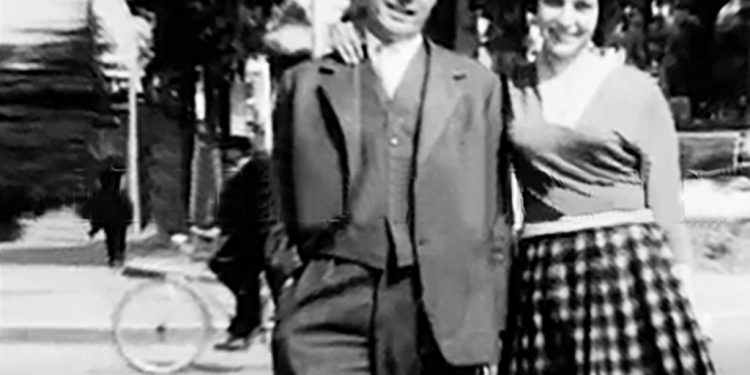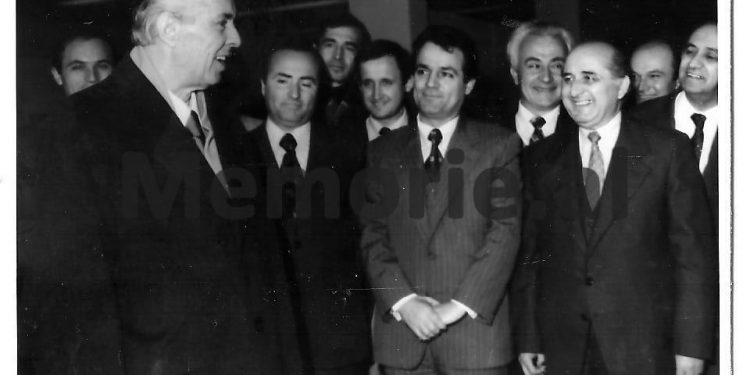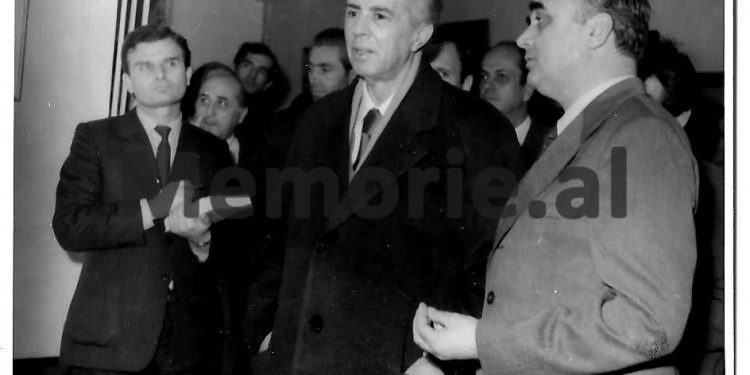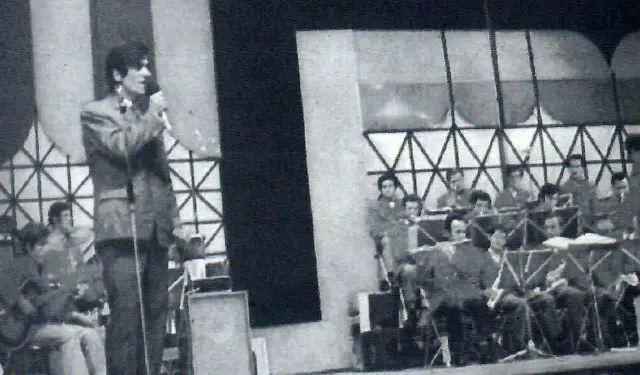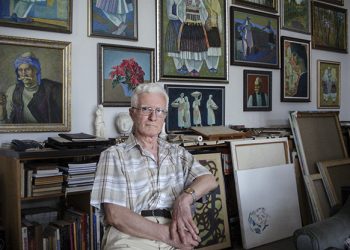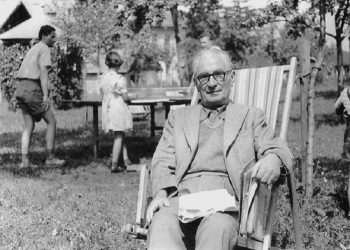Dashnor Kaloçi
Memorie.al publishes an archival document issued by the Central State Archive (fund of the former Central Committee of the ALP), which belongs to January 9, 1973, where Enver Hoxha’s discussion at the meeting of the Presidium of the People’s Assembly of the People’s Republic of Albania, on the topic: “Development of literature and arts to be done in the fight against any foreign ideological influence”, where the main leader focused on the problems of art, culture and literature, mentioning by name some writers and poets, such as Xhevahir Spahiu, about whom he said: he had read his poetry and did not like it, as it seemed to him like a fantasy that he had copied Sartre. The whole discussion of Enver Hoxha held at that meeting of the Presidium of the People’s Assembly just a few days after the 11th Song Festival on Albanian Radio and Television, which preceded the III Plenum of the Central Committee of the ALP, which will marked the beginning of the great ‘storm’ against the people of art and culture, where a large part of them led by Todi Lubonja and Fadil Paçrami who were labeled by Enver as “Head of the anti-party group in art and culture”, will ended up in exile prisons, or production sites in the most remote villages of the country.
“Foreign influences are also noticed in literature, in its various genres. In the magazine “Nëntori”, in the last issue of the year, I read a poem by Xhevahir Spahiu. I do not know him, but I have read some of his writings. My impression is that this literary is … somewhat fantasy. I read the creations of young people because I want to look at their political, mental development, feelings and inspirations. From these creations of young people there are parts that I like, there are those that I do not like, there are also dark or very extreme writings, there are also those that are not worth at all. But all these are published. This is not political, this is not a fair criterion. “Nëntori” magazine and “Drita” newspaper, as organs of the literary press, are interested not in publishing cabbages that are not worthwhile, but in publishing beautiful pieces, to inspire the masses for high goals, for the construction of socialism. But why does this happen? This is because there are editors who are not consistently guided by the great ideas of socialism, who do not consistently follow the straight line and the constant messages of the Party! In the editorial offices of these bodies there is subjectivism, there is hatred, there is a one-sided tendency, without excluding the tendencies to publish the writings of some and to criticize some others, even, in a denigrating way, even to insult them “. This is what Enver Hoxha said at the meeting of the Presidium of the People’s Assembly on January 9, 1973, which was held just a few days after the end of the 11th Song Festival on Radio Television, which as it is known would take place then objected initially to the meeting of the III Plenum of the Central Committee of the ALP, which was held on March 15 and 16 of that year. Plenum which was the beginning of the blow by Enver Hoxha against the main organizers of that festival, such as Todi Lubonja, General Director of Radio-Television, Fadil Paçrami, secretary of the Tirana District Party Committee covering art, culture and propaganda , who were also labeled as “Anti-party group in art, literature and culture” and would end up in prisons and internments along with some writers and artists and well-known figures of art and culture, such as Mihal Luarasi, the director of the Festival of 11th, playwright Minush Jero, writer and journalist Ibrahim Uruçi, etc., etc. For more on what problems Enver Hoxha discussed in that meeting that was and the prologue of a great ‘storm’ that would later explode against the people of art and culture, we know the document in question, which Memorie.al publishes to complete in this writing.
Speech of Enver Hoxha held on January 9, 1973 at the meeting of the Presidium of the People’s Assembly
DEVELOPMENT OF LITERATURE AND ARTS TO BE DONE IN THE WAR AGAINST ANY FOREIGN IDEOLOGICAL INFLUENCE
Discussion at the meeting of the Presidium of the People’s Assembly of the Republic of Albania
January 9, 1973
Since a question was asked here by Comrade Kahreman Ylli on issues of Education and Culture, I want to talk about exactly these two problems, however it seems as if they are off topic that we are discussing today in this meeting. However, I think I am within the topic, because the authorities must deal with all issues of development of our country, especially for culture and art, which are very important and complex problems. I wanted to talk about the care and assistance that should be given by the executive committees of the popular district councils and the Party there for these problems, for the help that these bodies should give to culture and art. Culture and art, as two very important areas of life of our country, are powerful tools for the realization of a necessary political and ideological education. They serve to broaden the horizons of the working masses, to beautify the feelings and lives of our people. That is why these important problems should in no way be underestimated in the face of the great economic problems that lie ahead.
We should not simplify their role and meaning, that is, we should not understand them. only as means of amusement. Of course, they also have this goal, but in no way are they limited to it, even it is not the main one. Culture and art play a major social educational role. The development of culture and art must be done on the basis of the principles of our Party line, on the basis of our Marxist-Leninist ideology, in the struggle against any foreign ideological influence, old or new. And we must say and emphasize this strongly, because there are foreign ideological influences, because we must guard against the penetration of foreign ideology into the spiritual life of our society in the consciousness of our people.
Bourgeois ideology, along with various revisionist influences, enter us through numerous channels of communication and social information, through the art of bourgeois and revisionist culture. This is not just a potential risk, as there is no concrete show, as is sometimes wrongly minimized. He appears in the spiritual life of our society. In our culture, literature and arts, especially in some areas where we have less tradition, such as cultivated music, figurative arts, etc. You too in the districts must beware of these influences, in whatever camouflaged and sugary forms they appear, through whatever “aesthetic” theorizing can be defended. Otherwise, if these influences are not fought vigorously and the necessary corrections and cleansings are not made in time, then they can lead us in the wrong direction, can damage the interests of building socialism in our country, can hinder development of socialism, to hinder especially the development of art and culture in the revolutionary socialist way, because they create confusions, lead to the perversion of the tastes, thoughts and feelings of the masses of the people, especially the youth.
The masses of the people, in order to be educated, demand from the people of art and culture beautiful works and creations not only of form but also of content. But both the form and the content must be harmonized with the line of the Party, with the interests of the people, and must be inspired by the ideas of our Party on the basis of the teachings of Marxism-Leninism. Any deviation from this principle, whether in form or in content, causes turbulence and these turbulences have bad consequences. Socialism requires rapid development, it requires a comprehensive development of the working masses – political, economic, social, cultural and artistic. But, in order to achieve this goal, our socialist culture should not be grafted with those forms and even more with that brand that are characteristic for the culture, art, music, theater, etc., of the capitalist and revisionist countries.
We must not allow our socialist ideas and feelings, expressed by the people of our art and culture, to be clothed in the foreign garb of a decadent, capitalist or revisionist society. We must not copy the development of the culture and art of these countries and not imitate the forms of their presentation. Our art and culture must be preserved from the false appearance, from the formalist effects and full of nuances of such forms of bourgeois culture, not to mention their content, which is in every way harmful and reprehensible. So, let us not withdraw from the false image, let us not allow it to affect the healthy life of our society, the consciousness of our working masses, which are the bearers of the development of our socialist culture, art and music.
We are resolutely against these influences. We want a culture and art to develop the spiritual world of our people in high Marxist-Leninist form and content. Take the district of Tepelena or any other district like this. There may be opinions that Tepelena is one of the most lost districts in the development of culture and art, but these opinions are not right, they are not real, because the people of Tepelena have sung and danced in different ways all their lives.; in various ways his songs and dances have expressed the feelings of the people. Through these dances and songs, it was sung to the people, their high virtues, bravery, love for the homeland and for the people; it was sung at weddings and other life events where the subtle humor of the people was also reflected. So, in all these songs and dances of the people, there is a great wealth of culture and art, which have kept alive, over the centuries, the martial and cultural traditions of the popular masses.
There are those people who theorize and say that this music is only valid as folklore that reflects the past life, but it is no longer valid to meet the spiritual needs of the people today. For these people, labe music, folk music no longer has any special value and often it is these same people who support those creations and those artistic performances, which do not have any brand or characteristic of our Albanian music. Of course, we do not remain and we are not left only to folklore. We also see this evolving. On the basis of folklore, new directions of musical and artistic development are born; moreover, cultivated music and art develop in new, more complex and sophisticated ways. They must always rely on the soul of the people, in their life and work, they must always have a clear national form based strongly on the art and music of our people and be permeated throughout by Marxist-Leninist ideology.
We must give our culture, art, music the Albanian physiognomy and character. What I am saying is not nationalism. Every country of the world has always wanted to give its music its national character and physiognomy. Let’s take Italy, in the TV shows of which some artists appear, with ugly appearances, of this country, however, even in Italy, there have been and still are people who fight to give the country music the intonation and color of the music. italiane. This war on different scales and with different intensity takes place not only in Italy, but also in other countries. And here we have very good musicians, who have made beautiful and original compositions, with a truly revolutionary and national spirit, creations that can be compared to many musical creations from the best that foreigners have done, in their places. These musical creations of our composers are so good and beautiful that, when you hear them, you get excited. And these musical creations, which are very good, are not few. In them many songs are sung about the homeland, the people, the Party, the field, the sea, the work, the life and the feelings of the people, that is, a whole variety of creations in which our socialist life is sung.
Speaking of the gaps and shortcomings of artistic musical creativity, it is necessary to recognize and emphasize these successes of our music (for which it is not the case here to expand), as well as of all art and literature, as they are also a necessary support to move forward, to create even healthier and more beautiful works. But some of these artists and writers, who have created such beautiful works, have also extracted some worthless things, both in content and form. And what is worse is that with these worthless creations, as we see, they find support from some leaders in the field of culture, giving the opinion that these are liked by the youth, that these are “innovative” creations, that suit our time, our pace of development, dynamism of life, etc., etc.
Not only that, but, in order to close the path of remarks, they savagely attack the critics of this music and put all kinds of epithets like “conservatives”, people who are left behind, because they do not understand the demands of the time and youth. “That” they have outdated tastes “. And these creations are given on TV and radio, accompanied by advertisements made by some of their fans. Today, as television expands, these problems take on a special sharpness, especially in the first stage of its spread. Television strongly influences the formation of people’s tastes, especially youth. In this view, our television must do a very qualified job, with a sound national and revolutionary spirit, in the fight against the bad influences of foreign television programs. Of course, our television is new. He is in the first steps. It still needs time to be technically adjusted. However, for now we should not claim too much in this regard, but the Party should be more careful that it be preserved from foreign ideology, from decadent culture and art.
The Party must take measures against foreign performances and be determined and consistent with them, because it does not lose, but only wins. Our culture, art and music should also benefit from the experience of foreign culture, music and art. I have emphasized other times that we are not xenophobic. But we hold a revolutionary critical attitude towards foreign culture, we try to take advantage only of that culture which contains values for our time, which responds to the cultural demands of the working masses. We therefore resolutely fight against any perverted influence, especially against that art which on the televisions of capitalist countries, is propagated for commercial purposes and is put at the service of a passing taste and fashion, as a means of empty entertainment and stunning of the masses. That music that suffers from such influences there are times that some of the organizers of music programs and speakers present it as a music that the youth likes. They even say that these songs are sought after by young people, workers, students, etc., that they have received many letters from them, from which it turns out that these songs are very much liked by the youth./Memorie.al
Continues in the next issue





